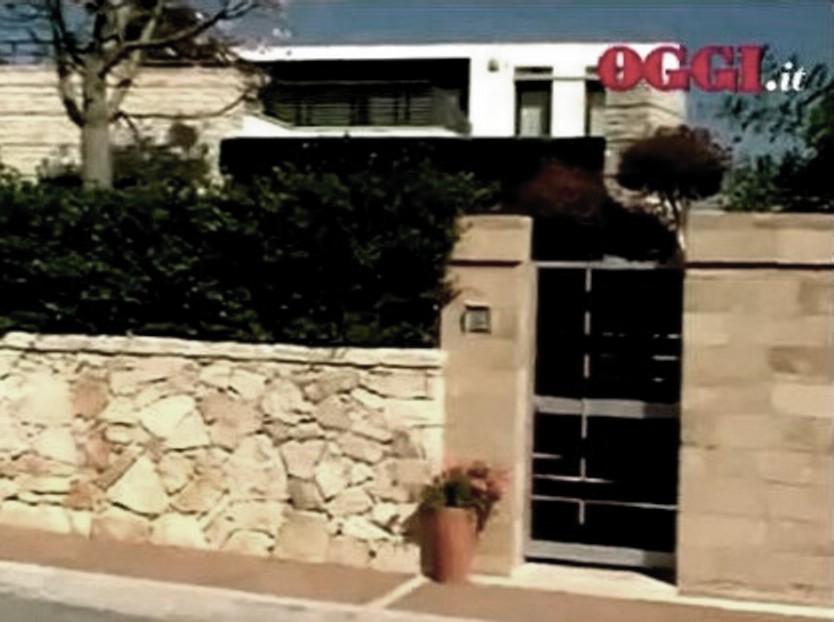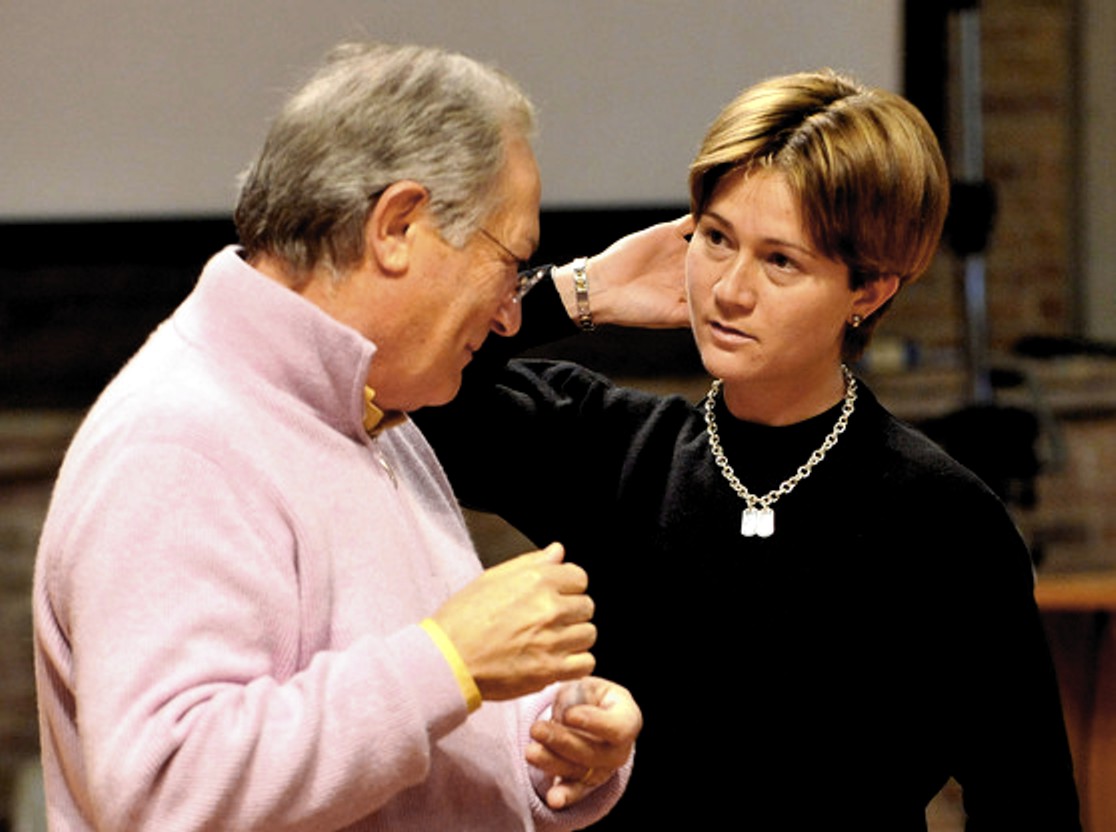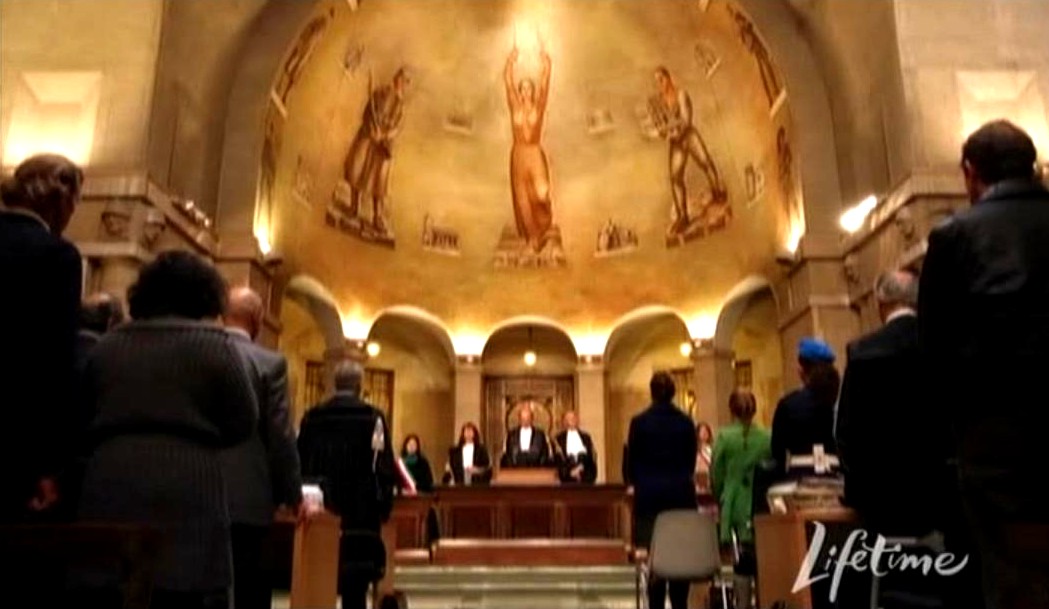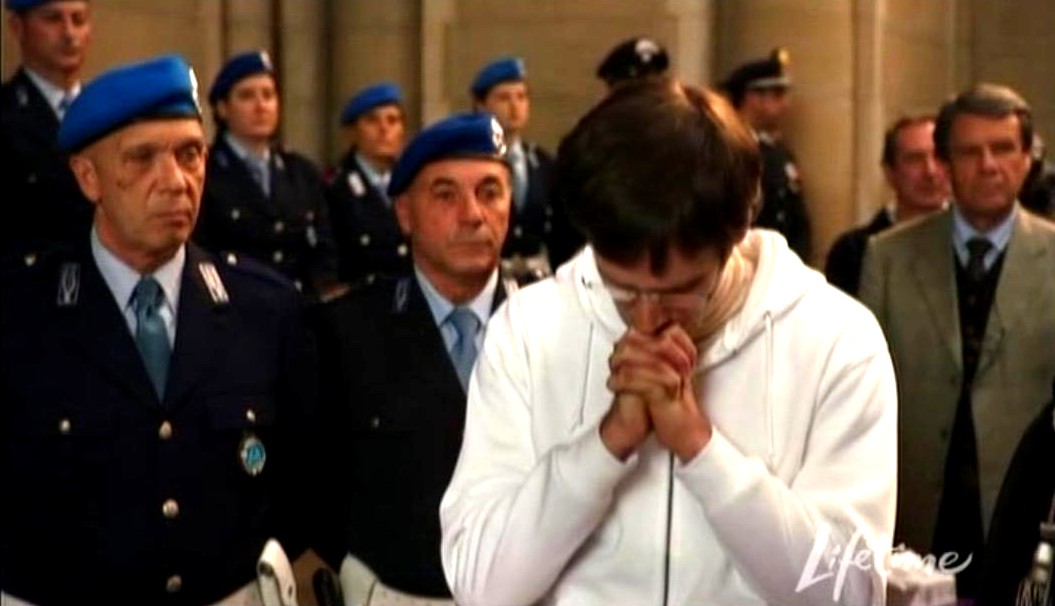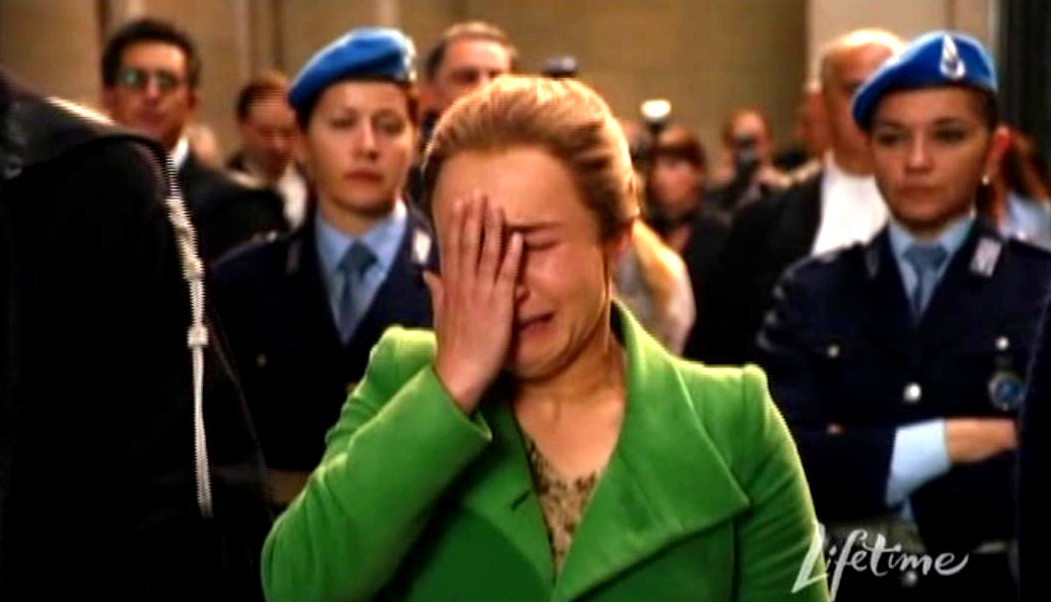
Category: Italian related
Monday, January 21, 2013
An Overview From Italy #2: Current Perceptions In Italy, Justice Perverters Fail, Mignini Vindicated
Posted by Machiavelli
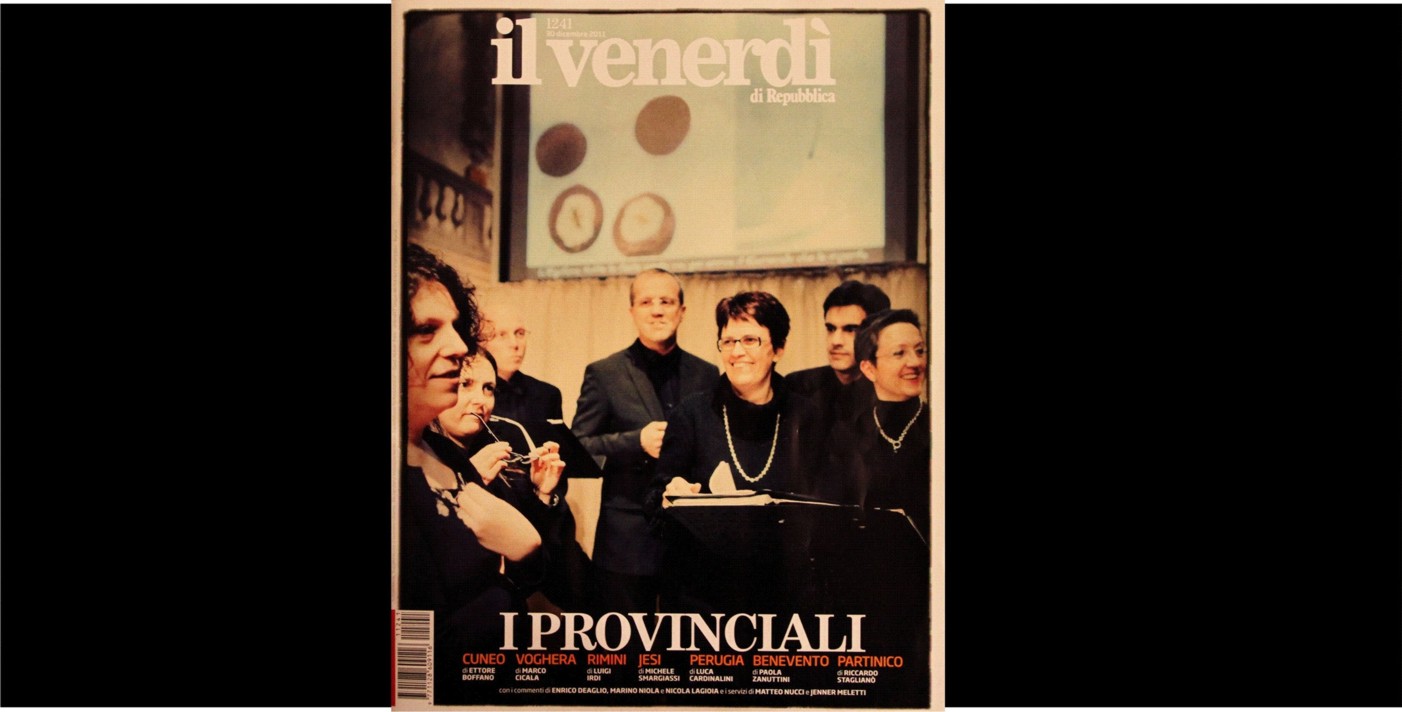
My previous report on the bad news remorselessly building here for the defense was on the Procura Generale appeal to the Supreme Court.
One year ago ““ between the end of December 2011 and beginning of January 2012 ““ there were only rare idle comments in the Italian press about the Meredith Kercher case, more or less sarcastically noting the “suspicious” circumstances of the Appeal trial. I recall how a mention of the topic was dropped into the last number of “ll Venerdì” of 2011.
“Il Venerdì di Repubblica” is the weekly magazine issued together with the newspaper “La Repubblica” (thus probably the most read magazine in Italy).
The cover theme of that week was provincialism ““ or better “the provincials” - the adjective used to assemble a sample of seven little cities (Cuneo, Voghera, Rimini, Jesi, Perugia, Benevento, Partinico), picked from different regions, and taken as examples on the theme, that is stories of “local colour”; what goes on in small “provincial places”. A few characters and stories are brought in to depict the local life of each place, and the voices of local authors adds something about the places.
The article about Perugia (at pages 62-68) was by Luca Cardinalini. In that number of Il Venerdì, having stories of “local colour” as weekly theme, there were shades of ironic tones for each city, often through the voice of local intellectuals. As Perugia is described, the Meredith trial is quickly recalled among its local stories; the reader can’t miss how this is viewed as in connection with another most remarkable feature of the city, that is Masonry.
According to Luca Cardinalini and Enrico Vaime, Masonry is called a “Specialty” of Perugia, like chocolate. Local author Enrico Vaime intends to convey the people’s perception about shady powers existing in the city, about a local environment saturated by plots and informal powers, as something behind recent strange judicial decisions such as the Hellmann verdict and the apparent dropping of the Narducci case. The widespread belief of Perugians that the Public Minister (prosecutor) is the righteous one shines through the words of Enrico Vaime.
Also notice how racism appears to be another key perception about the verdict. Quality media press in Italy has a typical style of understatement. This comment hints that it seems obvious that the Appeal was a racist verdict - and it was “expected” that they would find a way to blame the black one and the outcast.
Some of Perugian “provincialism” seems to include a very narrow localism of Perugian identity: a person from Orvieto is reported to be called “a foreigner” ; but this is because the cultural viewpoint is based on the assumption of a personal knowledge of all people. In among this, there is Vaime’s knowledge about how rooted Masonic tradition and power is in the city, in a scenario of “brotherhoods” and “tribes” (the article includes a photo of the most known “Masonic” monument in Perugia: the gryphon or griffen ““ the emblem of Perugia ““ grabbing a toppled Pope’s Tiara in a sign of rebellion).
The report by Vaime is objectively correct : the concentration of members of Masonic lodges in Perugia is the highest in the world, about 5 times the national average of Italy (which is anyway very high).
In Vaime’s wording decent people in Perugia are ‘Christians’ or ‘Communists’ ““ these are the names he uses to address the main categories he sees as “good” people, two transparent moral systems. He devolves skepticism toward the less transparent allegiances, the murky and informal connections to powers.
I believe these perceptions from one year ago, in this colorful article about Perugia, should be most interesting to the readers of this site.
The first part of the article on Perugia is not that interesting - it speaks mostly about a local character named Ivano Massetti, nicknamed “Savonarola of Umbrian football”, the director (“boss”) of a local TV network and leading showman of his own soccer talk show. I skipped this first part with depictions of local folks, and get to the point at p.66 where the Kercher case is first mentioned.
This is my translation of the article from this point:
[”¦](p.66 line 17):
As Enrico Vaime ““ a 100% Perugian, a writer, and among many other things fiercly provincial ““ already knows: “Only in Perugia do you hear people saying “actually Tizio [random guy] was not a native from Colombella, but from Piccione”, which is three times further”. And when his grandfathers (farther of his father) bearing the same name Enrico Vaime, moved his formal place of residence [to Perugia] from Spello, on the official documents they wrote “emigrated to Perugia and married to a foreigner from Orvieto”.
The roots are extremely deep. “Still today” Vaime says “when I say to my family “we go back home”, I mean here, in Perugia, where I have not owned a house for decades. And I still call the roads and shops with the names they had when I was a child, even if now the owners are foreigners, from Shangai or, as I say, from Terni”.
Vaime is cross with the bad reporters who described Perugia, in the Meredith murder case, as a capital of corruption and vice: “An invasion of charlatan journalists who, as they believed they were visiting a remote and lost province, they painted it as a sort of Chicago on the Trasimeno Lake”.
[The fact] that no Perugian was involved in that sad story, to them that was an irrelevant detail. And the trial ended just the way many Perugians expected: a black guy first wrongly put in jail, another black one convicted, the two white, good-looking, wealthy and well defended young people, free.
So it was that the Public Minister Giuliano Mignini became a target. He’s a Perugian whom the Perugians know as the dominus of the other judicial case ““ this also is, yes, entirely local ““ about which everybody talks and knows, but always in a low voice: the death of doctor Francesco Narducci, the one suspected of having ties to the crimes of the Monster of Florence. From the judicial point of view that was - by half ““ just another hole-in-the-water [a failure] for which some critics have hastily put the blame on some alleged lunacy of the public minister.
But”¦ however”¦ meanwhile, this [Naducci] corpse-swap was indeed found to have been for sure, a kind of unique case in the criminal history of the country. And, for what concerns the recent acquittals of those characters involved in this death, well, after almost a year and a half we are still waiting for the verdict motivations. All of the suspects were esteemed high-class professionals. That’s a perfect mix of strange deaths, sex, lead-astray investigations, and Masonry; this is in the city with the highest number of Masonic lodges in Italy.
Vaime sighs: “Masonry is something alien from me, but I have many friends who are in it. In Perugia it works as a compensation chamber for various powers, but also as an effort for the surge of the spirit to many decent people. Masters, masons and “33”, but all of them decent Perugians”. Masonry is considered a local specialty, just like the bruschetta or the Etruscan arch.
“One day you find out that that mediocre employee of your acquaintance, or the one who performed an incredible career in the public administration or in politics, is a “˜son of Horus’. Then you either laugh, or you slap yourself on the forehead just like saying to yourself “Wow! [how could I ] think about it!”. “That travet* [*a generic mediocre opportunist employee], too”
Vaime says “to me it is a strange Perugian, with little interest for the Egyptian god compared to his covet for entering inner circles of a certain world. Their internal motivation is “I want to see how the lords sit at the table”. But in there [Masonry], you see, there are also good Christians and good Communists; as has always happened in this province, which has the art of living together in its genes”.
[”¦. ]
This month ““ Jan 2013 ““ the Italian press returned to the topic of the case again in a few brief articles. This time it was because of Sollecito’s book.
After Maurizio Molinari’s report from New York on the book in September, and the busting by Bruno Vespa on Porta a Porta of Francesco Sollecito, who ended up openly contradicting his own son’s statements, another hint appeared in the local press about what is cooking up backstage.
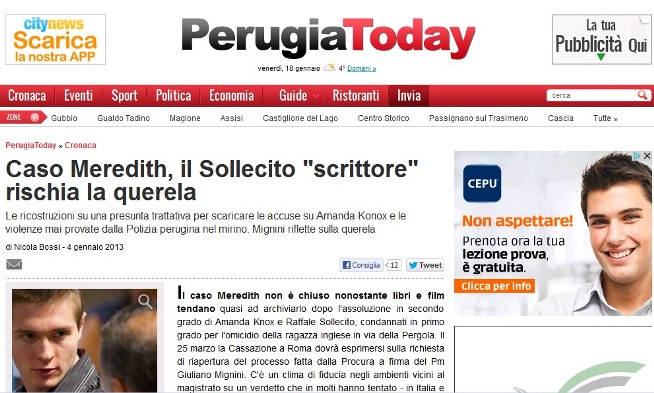
This article in Perugia Today has a neutral take, but the same understatement and kind of vagueness as it anticipates that something very likely will happen.
What I find most delightful is the quotation marks in the title around the word “author” ““ journalist Nicola Bossi doesn’t believe for a moment that Sollecito actually wrote the book:
Meredith Case: “author” Sollecito at risk of criminal lawsuit
The recounts about an alleged negotiation in order to pin the main charges on Amanda Knox, and unproven violence by the Perugia Police are under target. Mignini is considering criminal lawsuit.
Written by Nicola Bossi ““ Jan 4. 2013
The Meredith case is not closed, and this despite books and movies almost tend to drop it after the acquittal in second instance of Amanda Knox and Raffaele Sollecito - who were convicted in first degree for the murder of the English girl that took place in Via della Pergola.
On upcoming March the 25th the Court of Cassation of Rome will have to decide on the request for a re-opening the trial, submitted by the Procura with the authorization of Public Minister Giuliano Mignini.
In the environment of the magistrates there is confidence about a [guilty] verdict that many ““ in Italy and in the USA - have heavily attempted to discredit. But from the same environments around them, they talk about a greatly serene Mignini making assessments about the next strategic moves, following the attacks directed against him ““ and against those in Law Enforcement who cooperated with him ““ contained in the book by Raffaele Sollecito.
An upcoming criminal defamation lawsuit is becoming more and more likely every day, especially about some particular paragraphs. The material published by Sollecito has already resulted in discussions and clamor above all about claimed negotiations [with the prosecution] aiming to shift the blame onto Amanda alone, to be rewarded with his immediate release.
But there are also accusations against the Police about violence during his interrogations. “If you dare get up and walk, I beat you up in a bloody pulp and I kill you. I leave you in a pool of blood”. This is what you read in the book “˜Honour Bound’ issued in the US, as what Sollecito attributes to the Perugian officers.
“They wanted me to lie so they could frame Amanda”: this is the premise of the claimed negotiations claimed to indirectly involve Mignini too, which he always denied. Allegedly this would have been enough to get [Sollecito] out from prison soon, leaving the American woman in trouble.
So, these are grave accusations which Mignini apparently does not intend to let go unpunished. The criminal lawsuit is likely to be filed earlier than the date of Cassazione [25 March].
Another small piece of news is this article below published in Leonardo and written by Valentina Cervelli:
It seems basically a “commented” version of the Perugia Today article. Cervelli adds a few polite lines on her own thoughts in this piece, published on the Bbooks page of Leonardo,it; this is my translation:
Is Raffaele Sollecito going be sued soon for “Honor Bound”?
By Valentina Cervelli - 6. Jan 2013
Are there troubles in sight for Raffaele Sollecito? His “Honour Bound” book is going well in the United States in terms of sales, but here in Italy it might be soon result for him in a lawsuit for defamation by the Law Enforcement forces and by the Public Minister Giuliano Mignini.
As we know already, in Honor Bound ““ My journey to hell with Amanda Knox and return Raffaele Sollecito has reconstructed the whole judiciary story from his point of view, telling in his autobiography what [he says] is his own truth.
On March 25 Cassation in Rome will decide on the [prosecution] request for the re-opening of the trial submitted by the Procura authorized by Giuliano Mignini, after the acquittal in the second instance of the two main accused, Sollecito and Amanda Knox.
The young woman has returned back to her country and we bet it’s going to be difficult, if not impossible, to get her back in our country even in case of retrial after Cassation and a possible conviction. But lets leave aside this possible dispute and lets focus on the book. In Raffaele’s book Mignini is iimplicated because he reportedly comes out discredited. In the material published by Sollecito in his book he even talks about alleged negotiations in order to blame Knox alone, obtaining in reward a quick release.
And what about the allegations of Police violence during interrogations? Of course we don’t get into the merits, but it seems obvious that parties that may be considered offended would tend to launch a counter-attack to defend their dignity and their work. At the moment no lawsuit has been submitted. But with much probability that will be done before the decision of Cassazione.
By now we can only wait for the publishing of the book in our country, in order to assess with our minds what Raffaele Sollcito has written and the “hot” material published in his made-in-the-US autobiography.
By the way; one thing Valentina Cervelli might get wrong is the purported good sales of Sollecito-Gumbel’s book.
The Amazon.com site is reliable as quick indicator of a product’s success; the price of a new copy of “Honor Bond” on Amazon.com is now $ 3.51 (last week it was 3.76; the cover price is $ 24). It suggests sales are not quite as expected. The drop speed is significant if you consider that the book has been out for only four months.
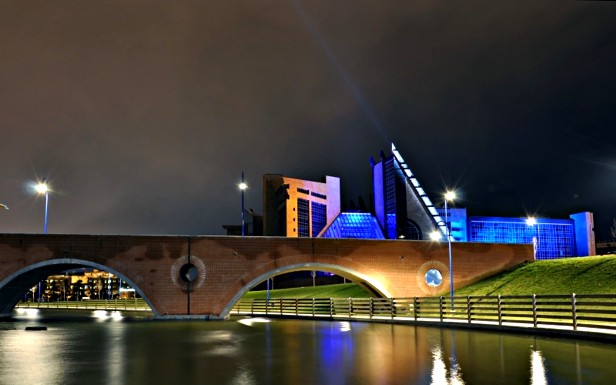
[Above: the Florence Palace of Justice]
While many honest magistrates seem to be working in Florence, there is still some strange behavior by one or two people in the Florence prosecution office.
Iin particular by the chief prosecutor there were some unexplainable decisions. As people reading this site know, Giuliano Mignini and Michele Giuttari were convicted (of some of the charges) in the first degree trial in Florence.
The motivations document was disconcerting because: besides the proof of their innocence on the main charge, what was described as the evidence on the remaining charge constituted extremely weak and vague arguments for what was claimed about Giuttari, while they were totally non-existent about Mignini.
In the second instance appeal as we know the court completely crushed the trial case.
The case against them collapsed not because of a technicality, as the FOAs falsely claimed. In the figment of their imagination the Knox supporters erroneously thought that the Florence court had an “option” to overturn the case, to find Mignini and Giuttari innocent, but that they instead decided to pass the judgment on to some other tribunal.
The pro-Knox believers are probably also ready to believe blindfolded that there was some kind of evidence against Mignini.
The Knox believers are wrong. What in fact happened in Florence is something almost unique in a judge’s career. The first remarkable event was the decision by the Florence court of nullifying the first degree verdict. They did not simply overturn the verdict (neither change, or “reform” it as we say) since an overturning would imply acceptance that a previous verdict actually existed and was legitimate.
The cancellation was in fact an in limine act about the validity , which does not require an assessment about it correctness. The court went way beyond. In fact they nullified the whole trial, not only the previous one in terms of judgment, but also the preliminary hearing, and the indictment; and even the request of indictment.
It is a legal outcome not comparable to a simple change or overturning because it is a ruling that the whole proceeding was illegitimate from the very roots. The investigation itself of Mignini and Giuttari was declared illegitimate.
If elements were found for the opening of an investigation, the prosecutor would be entitled to carry on their duties, though the investigators should be from another territory. This is important because the Florence court found evidence that people from the same office were involved in cases against Giuttari and Mignini, both as offended parties and as prosecutors.
Because of a basic conflict of interest, the local prosecutors were incompatible and the Procura of Florence had no jurisdiction. Not even Genoa would be compatible.
Florentine prosecutors therefore had no right to bring cases against Mignini and Giuttari. The investigation files now must now be sent to the competent jurisdiction ““ where they should have been sent from the beginning ““ which is Turin; there other legitimate prosecutors will decide if and how there is anything to investigate about, and if there are any charges to bring against anyone. The Florentine trials should have never taken place. The court ordered that the legitimate investigators are the Procura of Turin.
In addition, they also ruled that the court of Florence would be an incompetent jurisdiction in any further possible case that stems from that investigation: since the competent prosecution is Turin, in case elements for the indictment of anyone for any charge are found, in the future, everything should go to a court in Turin ““ this, only if there will be any charge to bring to court .
This decision in Florence was a total debacle for the Florence prosecutors. It is in fact “politically” much worse than an overturning of a verdict. It is not just a like a different conclusion on the merit, it is the decision to take away even the investigation from them, a kind of implicit censure of their work as highly illegitimate.
But at this point in the procedings, something even worse and even more strange happened. The Procura of Florence did something even more unusual, in fact unprecedented as far as I know.
Apparently the Florence prosecutors are not happy at all to pass the investigation file on to Turin. For some reason they seem instead to want to do unnecessary and irrelevant hard work instead. The Florentine prosecutors impugned the decision and revisited this at the Supreme Court against the Florentine judges.
This step is almost unheard of because the decision of the Florence appeal court is of a type that manifestly cannot be impugned at the Supreme Court. The recourse is obviously going to be declared inadmissible. If that submission was done by a private citizen, they would get a heavy fine for that.
Here it is a power in the Florence judiciary branch making this inadmissible move; for unknown reasons.
I’d like to know the real motive behind the latest Florence move, the only effect of which can be a waste of time (and money), a delay, of at least one or maybe two more years, which only makes the failure of the whole proceeding against Mignini and Giuttari more likely due to lapse on an expiration terms.
I say “I’d like to know” but in fact one motivation stands out as obvious: the whole proceeding against Giuttari and Mignini, from the first bringing of the charges at the lower courts, appeared as having a wasting of time among its purposes.
One practical effect - maybe a practical purpose - of pushing the charges against Mignini, was taking the file about the Monster of Florence case links with the Narducci case away from Perugia. By this move, the Florentine prosecutors managed to factually put their hands on the Narducci-MoF file and remove it from the investigating powers in Perugia.
Another effect of this was delay. Now this latest move looks as if its purpose were to delay, as much as possible, the transfer of the legal documents to Turin.
What is the ultimate event that, by all this, they seem to be seeking to delay? I can’t know for sure, I can only guess; in fact, I have only one answer, which also stands out as something obvious for those who know a bit of the backstage:
Giuliano Mignini is not an ordinary magistrate, he belongs to the Anti-Mafia Territorial Division of Umbria, and recently was selected for a further promotion by the Supreme Council of Magistrates.
In fact what is delayed is the advancing of Mignini’s career: in fact he has been already promoted to a directive function; but, by the rules, his taking the post was frozen while awaiting the outcome and conclusion of the Florentine prosecution.
Prosecutor Mignini is de facto already functioning as a prominent Magistrate in Perugia and considered as such; but formally he has not been given the directive power. Several people ““ among them Spezi and a number of his journalist friends, but possibly also other much more important people too ““ are likely not at all eager to see Mignini awarded further power.
About the latest endeavor by Raffaele Sollecito, who became liable for criminal defamation by writing false allegations about Mignini and others in his book, I expect - as logically unavoidable ““ that several powers and subjects will basically have no option but taking legal against him.
There will be a strategic necessity to doing this in order to prevent extradition issues in the future, but also, above all, on principle, because Sollecito made false claims about public institutions that needt to have their names cleared. Considering the kind of allegations against the judiciary as an institution, and considering that Mignini is a judge of the Anti-Mafia Division, this is the kind of lawsuit that I see as likely to be submitted on a national level, in Rome.
If that is the case, it would not be the only strange thing that the courts of Rome will deal with.
It seems like there is a kind of “curse” on proceedings related to the Narducci case. All sections of the Supreme Court which have been asked seem to have attempted to declare themselves “˜incompetent’ about re-opening the cases related to the Perugian doctor. The Cassazione is a huge office with a hundred judges working there, but maybe not so many of them are eager to deal with this case.
This could be only a coincidence. It only brings up to my mind, through a free association of thoughts, a more generic question ““ a personal question of mine ““ that is whether the words “Masonry” and “Politics” have an echo in Roman corridors too.
*****
Finally I want to add another significant piece of Italian news.
The news a week ago was that the Procura of Florence is investigating a possible corruption/mafia plot involving construction enterprises and politicians that revolves around the building of a new high speed railway in Florence.
Some 31 people are being investigated and among them is the former governor of Umbria. A huge drilling machine ““ nicknamed the “Mona Lisa” ““ used to dig subway tunnels in Florence was sequestrated by the Procura.
In the last couple of years Perugia’s prosecution office had a main role in fighting political corruption, but it seems that the Florence Anti-Mafia division is also active, just as it was in the times when the prosecutor Vigna worked with them.
Vigna was the one who first evolved the “secret sect” scenario in the Monster of Florence case, raising unexpected problems among the Procura staff.
Wednesday, March 14, 2012
Rome Appeal Court Rejects Vanessa Sollecito’s Appeal For Reinstatement In The Carabinieri
Posted by Peter Quennell

[Above and below: Francesco, father of Vanessa and Raffaele, outside their Bisceglie family home late 2011]
In 2008 Vanessa Sollecito and her father Francesco were caught on tape discussing the manipulation of Rome politicians into forcing changes upon the investigation team in Perugia.
Vanessa was fired from the Carabinieri the prestigious Italian national civil-military police force in November 2009 for demonstrating behavior and psychology inappropriate to a law enforcement officer’s job.
Our Italian poster ncountriside has just alerted us to the posting of the official statement that her appeal has been turned down.
The European Court is quoted in that report as confirming that national members have the right to fire official staff for psychological and behavioral cause.
The Carabinieri carried out a very thorough investigation which included the secret bugging of her mobile phone and her father’s phone. Jools translated one key conversation here. Her father suspects they are being bugged by the police but she blithely talks on, digging them in deeper.
This ruling was probably posted when Vanessa Sollecito was already in the air bound for Seattle (see the post below) but she would have known it was coming. This does not bode well for the criminal trial she faces along with her close family, possibly starting in Bari at the end of this month. The charges could incur prison terms.
The Sollecito family arc has almost never been reported on in the English language press. In 21 June 2008 Tom Kington of the Guardian did file this brief report.
The investigation into the murder of British student Meredith Kercher in Italy took a dramatic twist yesterday when the family of one of the suspects was accused of attempting to interfere with the inquiry.
Police tapping the phones of the father of Italian student Raffaele Sollecito overheard discussions that appeared to suggest plans being made to get senior politicians to use their influence and get detectives whom the Sollecitos considered hostile taken off the case. The phone tap information is in files handed over to lawyers as magistrate Giuliano Mignini officially completed the investigation into the strangling and stabbing of Kercher, from Surrey, who was found on 2 November semi-naked in a pool of blood in her bedroom in Perugia.
‘We’ve got to flay the Perugia flying squad,’ a family member was overheard saying, according to the Italian newspaper Corriere della Sera. ‘If we can get rid of the head of homicide and that other one, we’ll be OK.’
Relatives of Sollecito, including his sister, a policewoman, were also overheard discussing politicians who could help their case. Giulia Buongiorno, a lawyer and MP in Silvio Berlusconi’s ruling coalition, has now been retained to represent Sollecito. ‘She can help out on this case at a political level,’ Sollecito’s father was overheard saying.
Sollecito’s father, Franco, a well-to-do doctor from Bari in southern Italy, has campaigned to prove his son’s innocence, even to the point of allegedly leaking to a TV station a video obtained from the crime scene showing Kercher’s corpse, as well as highlighting perceived errors by the investigators, including the delayed recovery of parts of Kercher’s bra strap which were found to carry Sollecito’s DNA.
Police are holding in custody Sollecito, 24; his former girlfriend and Kercher’s flatmate, American student Amanda Knox, 20; and a third suspect, Rudy Guede, 21. All three deny involvement in the vicious killing.
As you can see here, Italian reporting like that translated by Jools usually includes a lot more damning detail.
Wednesday, January 25, 2012
The Curt Knox And Edda Mellas Diffamazione Trial Will Resume In Perugia 30 March.
Posted by Jools
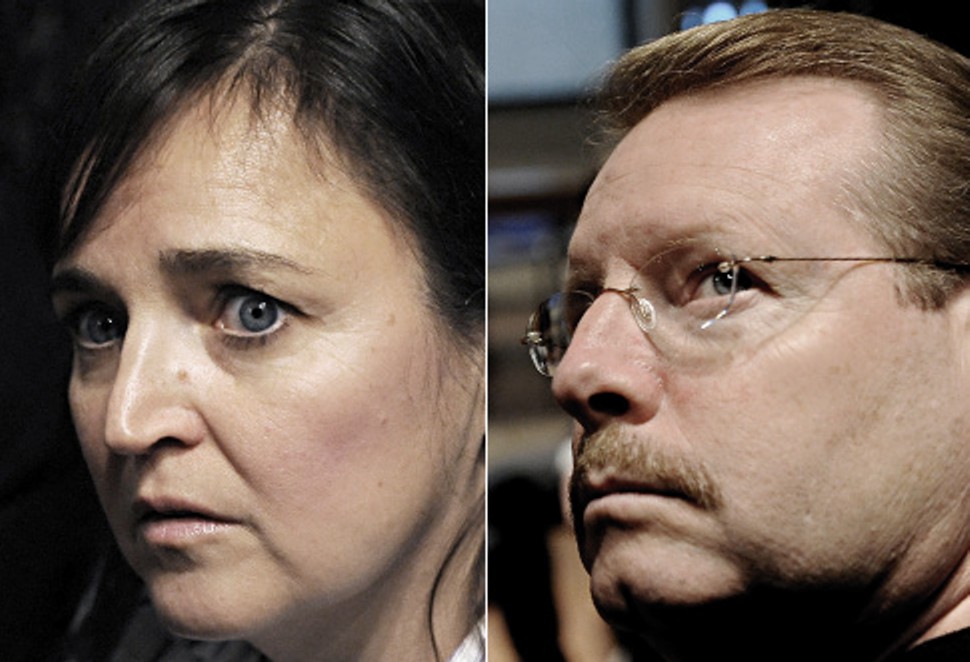
First, here is an explanation of diffamazione.
The charge of calunnia (art. 368) has been commonly translated as “slander” in the English/US media. This translation is incorrect, however, as calunnia is a crime with no direct equivalent in the respective legal systems.
The equivalent of “criminal slander” is diffamazione, which is an attack on someone”Ÿs reputation. Calunnia is the crime of making false criminal accusations against someone whom the accuser knows to be innocent, or to simulate/fabricate false evidence, independently of the credibility/admissibility of the accusation or evidence.
The charges of calunnia and diffamazione are subject to very different jurisprudence. Diffamazione is public and explicit, and is a more minor offence, usually resulting in a fine and only prosecuted if the victim files a complaint, while calunnia can be secret or known only to the authorities. It may consist only of the simulation of clues, and is automatically prosecuted by the judiciary.
The crimes of calunnia and diffamazione are located in different sections of the criminal code: while diffamazione is in the chapter entitled “crimes against honour” in the section of the Code protecting personal liberties, calunnia is discussed in the chapter entitled “crimes against the administration of justice”, in a section that protects public powers.
The suit against Curt Knox and Edda Mellas will commence in earnest on 30 March.
That is two days after the scheduled start of the Sollecito family trial in Bari for alleged subversion of justice, and about six weeks after the prosecution lodges its grounds for appeal with the Supreme Court against the appeal verdict on Amanda Knox and Raffaele Sollecito.
The defamation charges were lodged not by the Perugia prosecutors’ office but by those who considered themselves to have been defamed. Under their rules they are required to do that to safeguard the system.
Amanda Knox is quoted as saying how much she likes Italy and how she would like to be at that trial.
Amanda Knox “loves Italy and likes Perugia”.
She wants to return as a tourist but, if necessary, she’ll do so to testify in the trial against her parents”. To say as much was one of the defenders of the American [female], lawyer Carlo Dalla Vedova. Words came in the space of the proceedings for defamation against the parents of the student from Seattle, which is taking place in Perugia.
The name of Amanda Knox was included in the list of trial witnesses that the defence for Kurt Knox and Edda Mellas, lawyers Dalla Vedova and Luciano Ghirga intend to call to testify in court. “Both are accused of libel through the press in an interview which appeared in 2009 on the website of The Sunday Times” in which they spoke of alleged abuses on her daughter at the police headquarters during the questioning for the investigation into the murder of Meredith Kercher. For which crime Knox was provisionally acquitted on appeal.
In the meantime today the single judge Giuseppe Noviello has rejected an instance by the defence in relation to the territorial incompetence of the Perugian judiciary in dealing with the court proceedings.
“Amanda - said Dalla Vedova - is very interested” in the trial hearings against her parents and to which she is accused of calunnia, also against the flying squad police agents”. With her lawyers she maintains a correspondence by e-mail and every now and then they speak on the phone. “We have not seen her again ““ explains Dalla Vedova - since she was acquitted and went back to the United States. At Christmas though we exchanged greetings and yesterday she sent me an email asking for information on today’s hearing. Tonight I will tell her how it went”.
For the record the hearing in question was then postponed to March 30. On that date the witness for the prosecution will be heard. Then will be the turn for defence witnesses.
Tuesday, November 22, 2011
Mignini’s And Giuttari’s Florence Convictions Are Annulled: No Evidence, And No Jurisdiction
Posted by Peter Quennell

The ANSA news service is reporting that Giuliano Mignini’s and Michele Giuttari’s 2010 convictions have been annulled.
The Florence appeal court ruled scathingly that no evidence exists and also that the Florence trial court did not have jurisdiction. The case might be looked at again by the prosecutors in Turin or Genoa, which Mignini and Giuttari favor to get the spurious case against them more than just annulled. They’d like its root causes brought out. .
Mignini had caught the exact-same Florence prosecutor on tape, with a judge’s consent, bewailing the fact that the Monster of Florence cabal was tying his hands. That trial was simple a panicky attempt to get himself out from under which will hurt his career and the trail judge’s too.
It wasn’t Mignini who invented the Florence cabal (or satanic sect) notion, and he is suspicious of people (like Preston and Spezi) who work so hard to deny it. Many of the Italian Monster of Florence books also argue 180 degrees away from Preston. Hmmm. What hold does the Monster of Florence sect have over Preston? Is he a secret satanist?! The world really wants to know…
Mignin’s quoted remarks outside the appeal court make it sound like he would like to resume the investigation of why Dr Narducci died suspiciously in Lake Trasimeno. That had to be halted because the Florence prosecutor seized all the papers on the case.
We have posted several times as much on Mignini as most of the UK and US media combined, and we translated a long email from him, and two long and very revealing interviews.
Kermit’s contrast of Preston’s satanic obsessions with Mignini’s really very mundane interests are an absolute must-view.
Thursday, April 07, 2011
Sollecito Family Trial: On The Component About Their Alleged Attempt At Political Interference
Posted by Jools
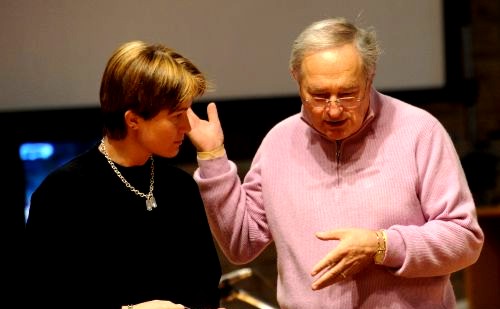
Almost nothing is showing up in the English language media on the court case Raffaele Solecito’s family are facing for allegedly trying to throw the murder investigation.
In the Italian media (as so often in this case) the reporting on this is franker, fuller, and on the whole way more honest. I previously posted articles that focussed mainly on the Telenorba TV video component of the trial.
This now is a translation of a June 2008 writeup of official wiretaps on a police association website of the political-influence component of the trial. The police association would be interested because it was some of their members allegedly being impugned.
Perugia Flying Squad: other interceptions published.
The role of Carabinieri lieutenant, Vanessa Sollecito, becomes stronger from the latest interceptions published by the daily newspaper LIBERO”¦
THE TELEPHONE CALLS OF THE SOLLECITOS’ TO POLITICIANS FOR RAF
The relatives are accused of manipulating the investigation. The sister a lieutenant: “I break a finger and I move to the civilian personnel this is how I’ll get him out”
Murder in Perugia. This is the sister of Raffale Sollecito, the student from Giovinazzo charged with the murder of the young English girl Meredith Kercher, who in a telephone call to her father Francesco tells him that she is prepared to break a finger just to transition into a civilian role in the carabinieri and succeed like this to pursue an “illicit” scheme to get her little brother out of prison and help him to get out of this sh**”¦ country.
Vanessa Sollecito is 31 years old and she is a lieutenant of the Carabinieri armed forces in the Lazio Region. She too, like her father and the rest of the relatives (uncle/aunt, a brother in law, cousins, dad’s second wife), try to gain favors from well known “excellent” people in order to exonerate Raffy and to remove the “real culprits”. These (“real culprits”) would be the police officers that have placed him under investigation and the magistrates who don’t want to know about freeing him.
The Sollecito “clan” (this is how who’s investigating the murder of Via Della Pergola defines Raffaele’s family) is written in the logbook register on the occasion of a second line of police investigation on the murder of November 2 last. The alleged offences are: defamation, invasion of privacy, and publication of arbitrary acts of a criminal case.
The time is 18:20 hours March 3 last [2008] when Vanessa phones her father (a well-known cardiologist [sic] in Puglia) and announces: “I’ve met a man, he is from the penitentiary police who works at the Ministry of Justice. He says that a union leader has explained to him that there is one way for transitioning into the carabinieri civilian staff role, although it is not very legal. And that is for me to break a finger, if things were to go down badly for Raffy, in order to lose the (fit to serve) eligibility” and move to the authority in control of civil service roles.
Francesco Sollecito gets very angry. Not about his daughter breaking a finger, but because he knows that his phone is being intercepted, and screaming he says: “You mustn’t speak on this phone, it is intercepted.” And Vanessa says: “Yours might be intercepted, but not mine!”
Two weeks later, it’s the morning of March 17 - at 10:59, Vanessa tries to phone the “˜Idv’ party - Senator Domenico Formisano - in order to go to meet him. And conveys to her father “He is our friend. He asked me a favor for a young man who must stay in Rome. He’ll be in his office Wednesday at 12:30, I hope to please him so afterwards I make use of the favor owed and will help Raffaele. He is the number two to Di Pietro.”
It’s [a date in] May at 10:23 and aunt Sara Achille (wife of Francesco Sollecito’s brother, Giuseppe) says: “Listen Francesco, Senator Domenico Nania told me to call him to arrange for a meeting in Rome. You know, it’s always better to have a nice… And Sara wanted to involve in the affair even the honorable Renato Schifani.”
Three days before, at four in the afternoon, Vanessa also spoke to her father in a “sarcastic” tone: “That lot are still going to take the foot prints”¦ Colonel De Fulvio, who is the one from RiS, says that they are still at this point”¦ and he’s offered himself to meet up with lawyer Bongiorno in terms of friendship, to see the scientific police material”¦”
[Her father Francesco] Sollecito interrupts her: “About these things you must not speak on this telephone, THIS ONE IS BEING MONITORED! Call me later.”
Uncle Giuseppe Sollecito, on July 30, utters offensive phrases toward the magistrates in Perugia because they haven’t gone in-depth into investigating the trail of the junkie found covered in blood near the victim’s house the day of the murder… “and this is just on purpose to keep Raffaele in prison”. His brother Francesco responds: “I’ll skin them alive those… and they’ll hear from me as well.”
Raffaele’s stepmother Mara Papagni, puts her complete trust in lawyer Giulia Bongiorno: That one “Ms Thirtyballs” will fix everyone”¦ She knows how to behave on certain occasions.
The strategy of Sollecito’s relatives appears to be clear in other wiretappings: they want to put pressure on the judges of the Supreme Court of Cassation so that they’ll agree to accept the appeal presented by the defenders of the young man, they prefer that some investigators whom they regard as inconvenient be removed from the investigation.
In their targets above all are Commissioner Monica Napoleoni, head of the [Perugia] Homicide Section, and Giacinto Profazio, head of the Flying Squad. In their phone calls, the Sollecitos call them bastards, pigs, sons of whores. And they all agree: “We must find someone to intervene at any rate. As written in the logbooks: Its necessary to stop police from doing other vileness.”
The “clan” accuses them of falsifying evidence to frame Raffy. And for this reason they contact journalists and television networks to supply documents and images for broadcasting (such as those depicting the tortured body of poor Mez after the murder and aired by a local television in Puglia).
They wanted to demonstrate that the scientific police played dirty to frame Raffaele. Now the Sollecitos’ and their respective wives are under investigation.
Monday, March 28, 2011
The Sollecito Family Criminal Trial And Civil Trial For Leaking Evidence Will Both Start On 29 April
Posted by Peter Quennell
The Sollecito family face charges for releasing an evidence video to the Bari TV station Telenorba showing Meredith’s body unclothed.
Also for attempting to influence some politicians to get some cops investigating the case moved on. Several Telenorba TV Bari staff-members will also also face charges. The trial was postponed five weeks ago as the judge was still on another case.
It is now reported in Italy by the news service Adnkronos that at today’s brief hearing a Kercher family civil suit against the Sollecitos for this disrespecting of Meredith will run in parallel.
The Sollecito defense team want to dispute the Perugia court’s jursidiction as the alleged crimes took place in Bari and Rome. That seems unlikely to fly as the evidence leaked was taken from Perugia.
The next court date for the Sollecito family will be Friday 29 April.
Thursday, March 24, 2011
The Civil Case Of Knox v Lifetime Will Be Considered By The Perugia Courts On July 4
Posted by Peter Quennell
On July 4? Big day in America. Seems today’s judge has a sense of humor.
The closed hearing in civil court in Perugia was brief, and there are just a couple of media images of Knox looking rather dispirited. The Italian media have not yet identified who are Lifetime’s legal representation or whether they were in court.
Knox’s lawyer Carlo Dalla Vedova said his client wants the Lifetime TV movie withdrawn. He claimed that the movie had already been viewed 687,000 times on Lifetime’s website from all over the world, and that there is a version with Italian subtitles.
He said the movie could do irreparable harm to the prospects of his client. Amanda Knox in her statement said: “I am shocked at this invasion of my life and the speculations made about myself… I was very disturbed at the images in the trailer I saw on TV.”
The Knox and Sollecito suits were all actually filed before the movie itself had ever aired. No specific scenes were complained about today in court, and as the movie for the most part adheres to Massei, with some artistic license, it will be interesting to find out precisely which scenes are the bad ones.
The movie appeared to give Knox at least one big break in public eyes by making the provisional finding of an HIV test seem highly malicious though the facts don’t support this.
Sollecito appears in the movie much more briefly than Knox, and his most dramatic scene is where he throws one of Knox’s various alibis under the bus. Otherwise he comes across like a pussy.
His legal team has also said they were filing suit against Lifetime both in Perugia and in New York. No sign yet of those filings.
Wednesday, March 23, 2011
Amanda Knox To Be In Court In Perugia Tomorrow In Hearing About Stopping The Lifetime TV Film
Posted by Peter Quennell

[Above: Lifetime TV has an office suite in this giant hitech building which Google is presently purchasing]
Past posts on this mixed bag of a TV movie can be found here.
Late February Amanda Knox’s lawyers filed suit in Perugia to stop the airing of the movie (so far aired maybe half a dozen times in the US) and Raffaele’s Sollecito’s lawyers filed suit in Perugia and (or so they say - we can find no court record) also in New York.
The Perugia judge at the first hearing took a pretty relaxed view of the urgency of the matter and so it is only now that legal teams for Lifetime and Amanda Knox will face one another in court. The suit claims that the movie “violates the reputation” of Amanda Knox.
Very substantial payment for damages has been requested. If the New York suit also proceeds (unlikely as US law is not exactly favorable) the total asked appears to amount, converted from Euros, to over two hundred million dollars to compensate for sullied reputations.
Today’s Italian media reports in ANSA and AGI dont say very much more than that, except that Amanda Knox would like to be present in court.
As this is not Sollecito’s team’s suit, this is about the first time that one appellant will appear in court without the other. No word at all yet on the constitution of Lifetime’s legal team.
Thursday, March 10, 2011
Giuliano Mignini’s Trumped-Up Conviction For Guessing Right In The MOF Case
Posted by TomM
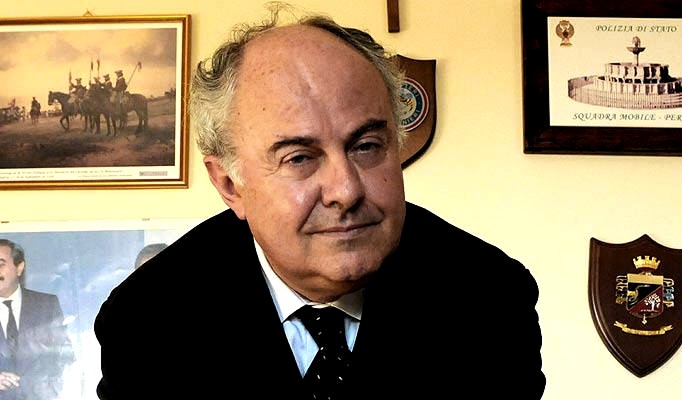
We previously posted on the case here and here and here.
Giuliano Mignini became involved in the Monster of Florence case only years after many people had already come to believe a satanic sect in Florence might be behind the MOF murders. But he pursued it with a vengeance when a body that in 1985 mysteriously washed up on the shore of a lake in his jurisdiction showed signs of murder.
And when the crime fiction writer Doug Preston injected himself into the case under a pseudonym and appeared to be planting evidence, Mignini gave him a very brief shaking up and Preston timidly removed himself from the case and from Italy - to turn to inventing a whole lot of fiction about it from safely across the Atlantic.
Here now is the fine Italian journalist Adriano Lorenzoni, describing The Strange Conviction of PM Giuliano Mignini by the prosecutor whose frustrated conversation was captured (the recording seemed to prove there was indeed a satanic sect in Florence) in objective terms that prove sympathetic to Mr Mignini.
Translation here is with the kind help of my fellow poster Clander.
The Perugian investigation of the instigators of the crimes of the Monster of Florence has, in effect, been stopped.
In January of 2010 the Public Prosecutor of Perugia, Giuliano Mignini, and the former head of the flying squad of Florence, Michele Giuttari, were sentenced by the Court of Florence on the charge of abuse of office in an investigation into some Perugians connected to the “instigators” of the crimes of the Monster of Florence. According to the prosecution’s theory, Mignini and Giuttari illegally wiretapped and investigated journalists and law enforcement officials to influence their activities.
These are abnormal proceedings, since the Public Prosecutor Mignini had been properly authorized by the Investigating Magistrate of Perugia to use wiretaps for his investigation, actions that he had the duty to carry out. Abnormal proceedings also because leading the investigation against Mignini and Giuttari was the same Public Prosecutor’s Office [Procura] that Mignini [PM di Perugia], had investigated the head of, Ubaldo Nanucci. Not by chance did Dr Mignini object to the jurisdiction of that Office [Procura] to carry out the investigation and raise objections of the legitimacy of the judgment. The Court of Appeal of Florence will hear the appeal next November 22 [2011].
This all springs from a recording made by Michele Giuttari of one of his conversations with a Deputy Prosecutor of Florence, Paolo Canessa, in which Canessa states that his boss was not a free man and admits to having been hindered by the then Prosecutor General, Ubaldo Nannucci, regarding the requests of Dr Giuttari into the investigation of the crimes of the Monster of Florence.
Giuttari [then] sent the recording to Mignini, who turned it over to the Prosecutor’s Office of Genoa which had been authorized to investigate the magistrates of Florence. Prosecutor Nannucci was then investigated [verrà inquisito] for having slowed down, or rather obstructed, the investigation of the Monster of Florence. Genoa promptly dismissed [archivierà ] it.
Giuttari continued to complain to Mignini about the conduct of the police commissioner of Florence, De Donno who, as ordered by the Ministry of Internal Affairs, should have set up a new wire tapping room for the GIDES (serial crimes investigative unit) where Giuttari and his men were working [si erano sistemati]. De Donno never set up the new room [cosa che non fa]. Mignini charged him and sent the file to Florence.
A question comes to mind: where is the abuse of office in all of this?
It is also puzzling why there was such an apparent lack of interest in the investigations conducted by Michele Giuttari, even when they are not being obstructed. “The instigators must not be investigated because there are only conjectures, a fruitless waste of time,” Giuttari is told.
Astonishing. As long as the [lowlife] “snack buddies” are being investigated [for the MOF , all is well. It’s fine to investigate Pacciani, Lotti and Vanni; but when the investigation tries to produce greater results [si alza il tiro], problems start to arise. Michele Giuttari was even relieved of his post and transferred.
Prosecutor Mignini’s office is searched and documents from an ongoing investigation into the death of the Perugian doctor Fransesco Narducci are seized, documents which Mignini had without success objected were secret.
Another question comes to mind: why so much fear (in Florence and in Perugia) about the investigation of the death of Francesco Narducci?
According to the Perugian Public Prosecutor [Mignini], Francesco Narducci was connected in some way to the Monster of Florence case. Giancarlo Lotti, one of the [lowlife] snack buddies, asserted that some doctor was given the amputated parts of a female body, in exchange for money.
Crimes, therefore, on commission [i.e. murder or mayhem for hire] by a doctor. A real doctor, not the mere pharmacist, Francesco Calamandrei, of San Casciano val di Pesa. Among other things, during the investigation it emerged that Calamandrei and Narducci knew one another. Narducci then died in unclear circumstances on October 13, 1985. Drowned in the waters of Lake Trasimeno. One month after the last murder committed by the Monster of Florence.
Suicide was claimed at that time. A truth considerably less than believable. So much so that while the Preliminary Investigations Judge [GIP], Marina De Robertis, dismissed the case for lack of enough evidence [con formula dubitativa] the hypothetical murder case against certain suspects (the journalist Mario Spezi, the pharmacist from San Casciano, Calamandrei, and others) and declared it time-barred, still, evidence exists of other crimes committed at the time: the concealment and abduction of a corpse and the falsification of numerous public records.
Moreover, since last April, we have been waiting to learn the reasoning with which, for different reasons, including claimed lack of evidence, the Preliminary Hearing Judge, Paolo Micheli, acquitted twenty people (including Narducci’s father and brother) of charges of forgery, criminal conspiracy, dereliction of duty, and concealment of a corpse.
Against this decision of the Preliminary Hearing Judge, Public Prosecutor Mignini will most likely file an appeal as soon as the sentencing reports are lodged which should have been lodged last July 20 [2010].
Mignini and Giutarri were acquitted of the charges of abuse of office (and Mignini also of aiding and abetting Giuttari) because it was not proven that any crimes were committed [i fatti non sussistono] (and the Florence Prosecutor’s Office did not appeal).
[The abuse of office charges] related to their so-called parallel investigations to those of the Genoa Prosecutor’s Office, which was investigating the former head of the flying squad of Florence for false acts [falso] due to the recording of the conversation with the deputy [Prosecutor] Canessa (of which we have spoken above) which, according to the indictment, had been tampered with. This investigation then led to the search of the office of the Public Prosecutor of Perugia [Mignini’s office] and the seizure of numerous investigation documents.
Needless to add that the proceedings against Giuttari and the two police officers concluded with a judgment of non-suit for absolute lack of foundation of fact, as proclaimed by the Genoan Preliminary Hearing Judge Roberto Fenizia. The “aberrant” conviction of Giuliano Mignini does not have immediate disciplinary consequences of any kind. The disciplinary proceeding is in fact suspended until the resolution of the criminal case on which it depends.
And Public Prosecutor Mignini is able to continue to carry out his functions, in trials of great importance and of international interest, such as that relating to the death of the English student, Meredith Kercher.
Thursday, February 24, 2011
Thursday Trial Hearing Scheduled For Sollecito Family Charges Of Perversion Of Justice
Posted by Peter Quennell
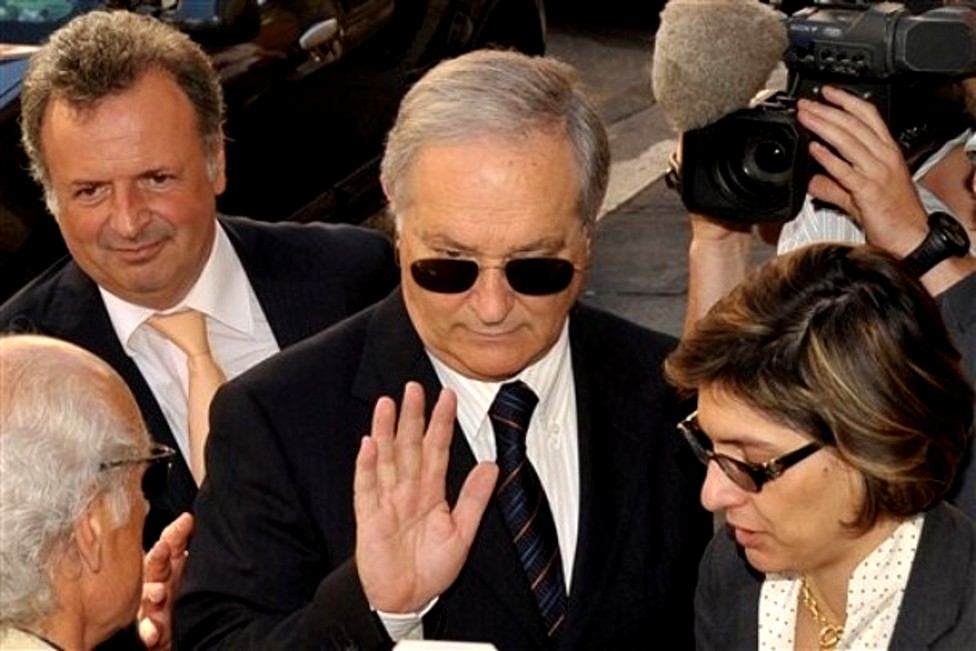
[Above: Raffele Sollecito’s father Dr Francesco Sollecito who is a urologist practicing in Bari]
Update: Italian media sites are reporting that the new trial date for the Sollecitos is 28 March as the investigating judge Alberto Avena has commitments outside Perugia. The prosecutors are Giuliano Mignini and Manuela Handy. The Sollecito defense team is Marco Brusco, Francesco Crisis, Luca Maori and Donatella Donati.
There should be a hearing in Perugia in the case against the Sollecito family on Thursday.
Francesco (Sollecito’s father), Vanessa (his sister), Mara (his stepmother) Giuseppe (his uncle) and Sara (his aunt) all of Bari have been charged with leaking a crime scene video out of the 10,000-plus pages plus of evidence and exhibits to Telenorba, a Bari television station.
It was an apparent attempt to discredit the investigators although the video backed that claim weakly if at all. The video included deeply upsetting closeups of Meredith’s uncovered body and the wounds to her neck. It was later re-broadcast by the state network RAI throughout Italy.
Richard Owen of the London Times in an article no longer online described the Telenorba and RAI broadcasts as follows.
Relatives of Meredith Kercher, the British student murdered in Perugia in November, were said to be shocked and distressed last night after images of her bloodied corpse were broadcast on Italian television…
Telenorba, which showed the footage late at night, warned viewers that it was disturbing and suitable only for adults. It showed police scientists in white protective clothing pulling back the duvet to reveal Ms Kercher’s body and slashed throat, and turning the corpse over to examine her bloodied back.
Her eyes were covered by a mask. RAI did not include this part of the footage in its news broadcasts.
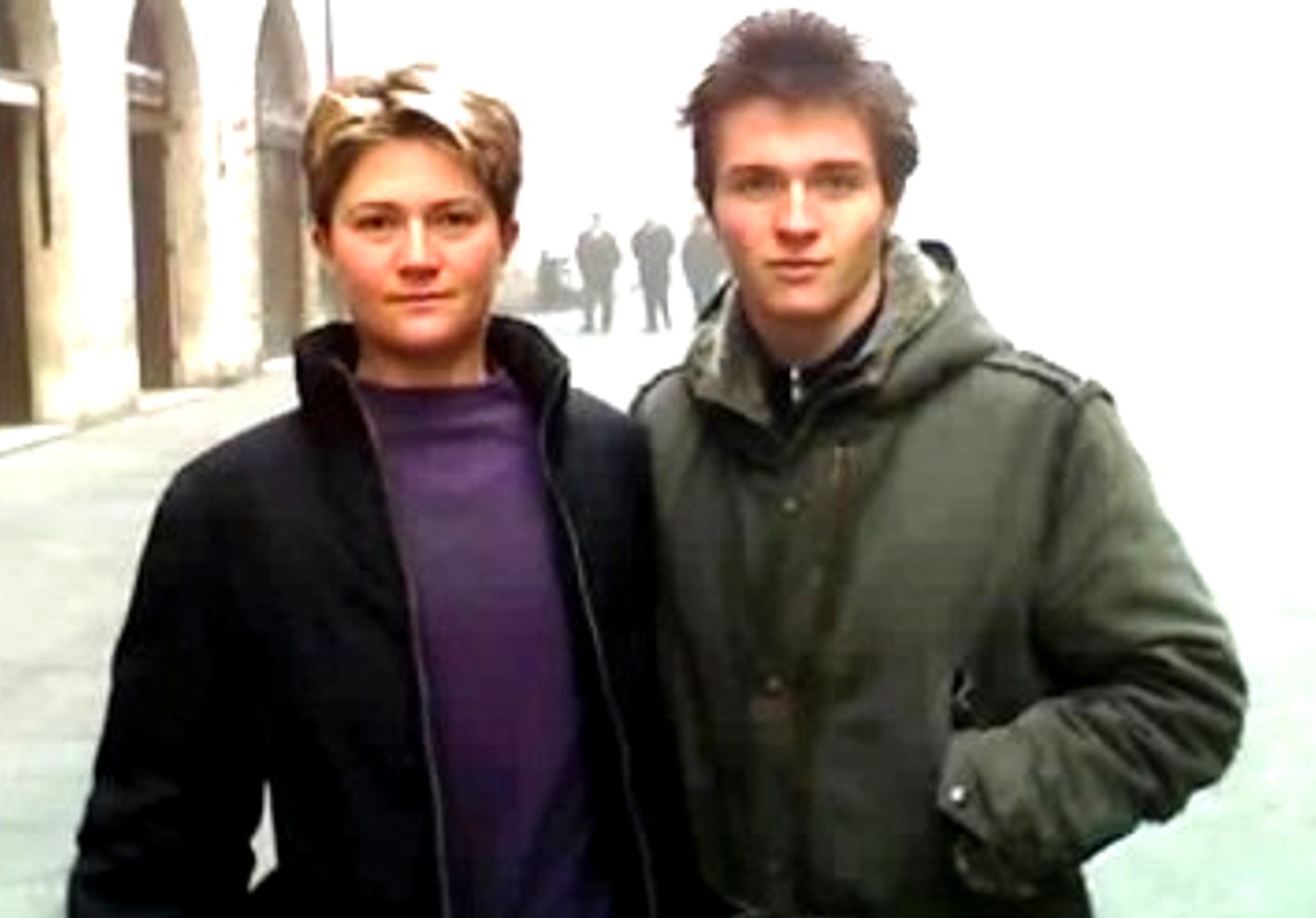
[Above Raffaele Sollecito with his sister Vanessa Sollecito who was fired late in 2009 by the Carabinieri]
This is a translation by Jools of an April 2009 report in La Nazione.
The prosecutor of Perugia has served notice of the completion of four investigations into Raffaele Sollecito’s family members and two journalists of the TV station Telenorba on the transmission of a forensic video in which the body of Meredith Kercher wa shown…
The report on the investigations (usually a prelude to a request for trial) indicates crimes were committed of defamation, invasion of privacy, publication of arbitrary acts of investigation and publication of gruesome acts.
According to the reconstruction by the Perugia prosecutor, the father and sister of Raphael Sollecito had legitimately obtained the scientific survey of the police, and had then illegally provided it to Telemundo.
The report also cites a journalist and the editor of Panorama for the publication of an article in which they reported that blood samples from Meredith had revealed an alcohol concentration above the legal norm - implying she was drunk when she was killed. This claim was proved a lie in the course of the forensic tests.
And this is a translation by Jools of an AGI news-service report of April 2009 also no longer online.
Eight “notices of termination of the investigations” have been reported by the public prosecutor of Perugia… Four Sollecito family members, the TV journalist on Telenorba and the director of the station, are accused of the crimes of defamation, invasion of privacy, publication of documents during the investigation, and publication of gruesome acts….
According to the reconstruction, the Sollecito family members delivered to Telenorba the video and photos of the crime scene survey carried out by the forensic team on November 2 of 2007 in Meredith’s house. Telenorba then put the material on the air.
Other investigations are on-going.
The family members are all also charged with an attempt to manipulate the Knox-Sollecito trial through the political process. There is said to be evidence wiretaps capturing them trying to get family friends in the Italian parliament in Rome to have several senior investigators removed from the case.
Vanessa Sollecito was fired from the Carabinieri late in 2009 for her involvement in this attempt to manipulate politicians, and we believe she still faces a further internal Carabinieri hearing.
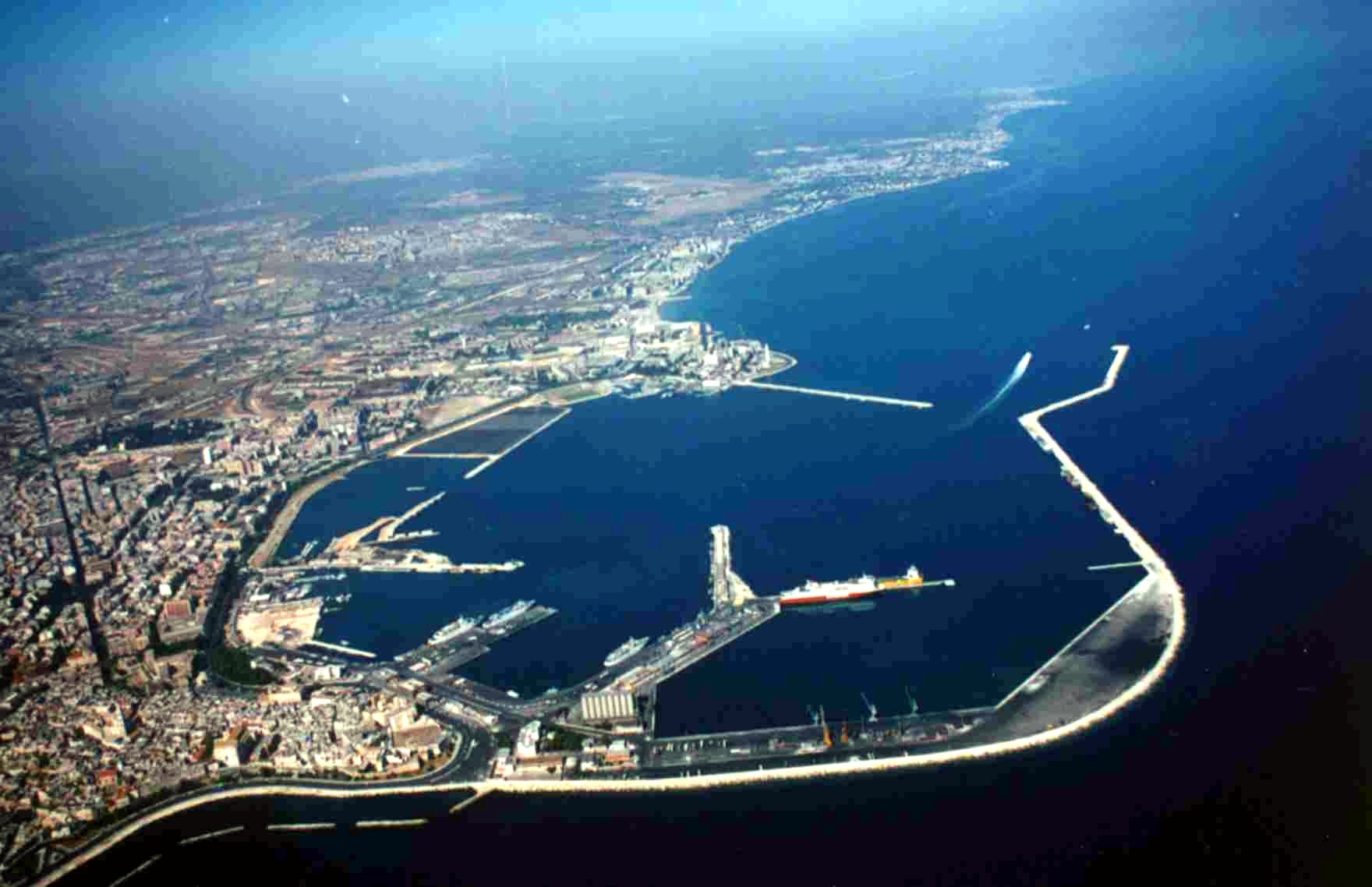
[Above: the town of Bari in south-east Italy where ferries depart for the east Adriatic coast and Greece]


